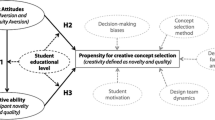Abstract
It is a key competence of companies to develop innovative products. Those products are developed by a team of people from diversified backgrounds. However, merely forming a multidisciplinary team does not directly link to a higher degree of creativity of outcome. The degree of creativity of outcome is largely contributed by early phase of design projects, namely concept development. It can be further divided into divergence (such as idea generation) and convergence (such as evaluation and selection of concept). Although creative ideas should be selected during the convergence process, factors influencing successful concept selection are still unknown. Therefore, it is of importance to support multidisciplinary teams in concept developments, especially on concept selections. We hypothesize that people prefer specific aspect of ideas depending on their discipline. This paper focuses on the development of a questionnaire and clarify differences in the choice of ideas between arts and engineering students. The developed questionnaire has eight pairs of ideas, each of which has an idea having a significantly higher degree of feasibility but a lower degree of novelty (feasible idea) and the other idea has vice versa (novel idea). Participants are asked to choose one good idea from each pair. The questionnaire was responded by both fifteen engineering and art students. The result suggests that there might be more similarity than significant differences in the preference of creativity due to educational backgrounds. The results also imply that the novelty aspect tends to get fewer attentions while usefulness gets much attention. This paper offers findings in factors of individual idea selections.
Access this chapter
Tax calculation will be finalised at checkout
Purchases are for personal use only
Similar content being viewed by others
References
Nikander, J.B., Liikkanen, L.A., Laakso, M.: The preference effect in design concept evaluation. Des. Stud. 35(5), 473–499 (2014)
Council D: The design process: what is the double diamond. Online. The Design Council Available at: https://www.designcouncil.org.uk/news-opinion/design-process-what-double-diamond. Last accessed 22 Nov 2018
Toh, C.A., Miller, S.R.: How engineering teams select design concepts: a view through the lens of creativity. Des. Stud. 38, 111–138 (2015)
Gosnell, C.A., Miller, S.R.: But is it creative? Delineating the impact of expertise and concept ratings on creative concept selection. J. Mech. Des. 138(2), 021101 (2015)
Toh, C.A., Miller, S.R.: Choosing creativity: the role of individual risk and ambiguity aversion on creative concept selection in engineering design. Res. Eng. Design 27(3), 195–219 (2016)
Falk, D.R., Johnson, D.W.: The effects of perspective-taking and egocentrism on problem solving in heterogeneous and homogeneous groups. J. Soc. Psychol. 102(1), 63–72 (1977)
Oxman, R.: Think-maps: teaching design thinking in design education. Des. Stud. 25(1), 63–91 (2004)
Fleming, L.: Perfecting cross-pollination. Harvard Bus. Rev. 82(9), 22–24 (2004)
Ahmed, S., Wallace, K.M., Blessing, L.T.: Understanding the differences between how novice and experienced designers approach design tasks. Res. Eng. Design 14(1), 1–11 (2003)
Menold, J., Jablokow, K.: Exploring the effects of cognitive style diversity and self-efficacy beliefs on final design attributes in student design teams. Des. Stud. 60, 71–102 (2019)
Badke-Schaub, P., Goldschmidt, G., Meijer, M.: How does cognitive conflict in design teams support the development of creative ideas? Cognitive conflict in design teams. Creativity Innov. Manage. 19(2), 119–133 (2010)
Toh, C.A., Miller, S.R.: Creativity in design teams: the influence of personality traits and risk attitudes on creative concept selection. Res. Eng. Design 27(1), 73–89 (2016)
Christiaans, H., Venselaar, K.: Creativity in design engineering and the role of knowledge: modelling the expert. Int. J. Technol. Des. Educ. 15(3), 217–236 (2005)
Dean, D.L., Hender, J., Rodgers, T., Santanen, E.: Identifying good ideas: constructs and scales for idea evaluation. J. Assoc. Inf. Syst. 7(10), 646–699 (2006)
Sarkar, P., Chakrabarti, A.: Assessing design creativity. Des. Stud. 32(4), 348–383 (2011)
Hallihan, G.M., Cheong, H., Shu, L.H.: Confirmation and cognitive bias in design cognition. In: ASME 2012 International Design Engineering Technical Conferences and Computers and Information in Engineering Conference, pp. 913–924 (2012)
Mueller, J.S., Melwani, S., Goncalo, J.A.: The bias against creativity: why people desire but reject creative ideas. Psychol. Sci. 23(1), 13–17 (2012)
Landis, J.R., Koch, G.G.: The measurement of observer agreement for categorical data. Biometrics 33(1), 159–174 (1977)
Acknowledgements
This research was supported by the Japanese Society for the Promotion of Science, KAKENHI Grant Number 20K20116.
Author information
Authors and Affiliations
Corresponding author
Editor information
Editors and Affiliations
Rights and permissions
Copyright information
© 2021 The Author(s), under exclusive license to Springer Nature Singapore Pte Ltd.
About this paper
Cite this paper
Taoka, Y., Suka, Y., Nishida, Y., Saito, S. (2021). Questionnaire-Based Investigation of Preferences in Idea Evaluation Depending on Educational Backgrounds. In: Chakrabarti, A., Poovaiah, R., Bokil, P., Kant, V. (eds) Design for Tomorrow—Volume 3. Smart Innovation, Systems and Technologies, vol 223. Springer, Singapore. https://doi.org/10.1007/978-981-16-0084-5_2
Download citation
DOI: https://doi.org/10.1007/978-981-16-0084-5_2
Published:
Publisher Name: Springer, Singapore
Print ISBN: 978-981-16-0083-8
Online ISBN: 978-981-16-0084-5
eBook Packages: EngineeringEngineering (R0)




